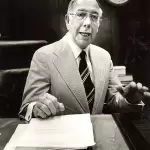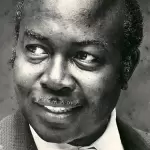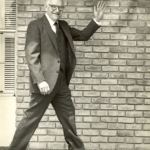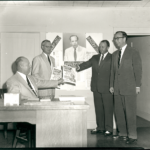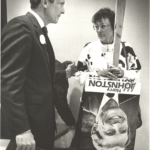Elected Representatives
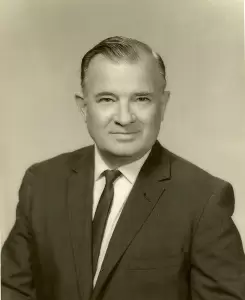
The rapid growth of Palm Beach County attracted dedicated decision-makers to public office. Some were born here, while others arrived later in their lives. Although no Palm Beach County native has yet lived in the Governor’s mansion in Tallahassee, one did maintain a residence here during his term. Claude Roy Kirk, Jr. (1926- ) leased the Maddock family’s Duck’s Nest in Palm Beach with his second wife, Erika.
Kirk’s first campaign was for the U.S. Senate; he was defeated by Spessard Holland in 1964. Two years later, however, Kirk became the first Republican governor of Florida in 94 years, and at 40, the youngest Florida governor to date. Kirk lost re-election in 1970 to Reubin Askew and two more attempts—in 1978 to Bob Graham, running as a Democrat, and in 1990 to incumbent Gov. Bob Martinez, after returning to the Republican Party.
Lake Henry Lytal, Sr. (1906–1992) came to Palm Beach County as a child and later served for 32 years as a Palm Beach County commissioner, from 1942 to 1966 and 1970 to 1978. Nicknamed “Mr. Democrat,” he fought for the rights of women and minorities and helped found Little League Baseball here. Dr. Clarence L. “Carl” Brumback came to Palm Beach County in 1950 to start a county health department and worked closely with Lytal when he was chair of the Board of County Commissioners:
Lake Lytal was, in my opinion, a wonderful man who had the interests of the public at heart, and he wanted to see that they got services, and particularly health services. He was well aware of the fact that many did not. He was a facilitator. I couldn’t have done without his help in many instances.
Dr. Clarence L. Brumback
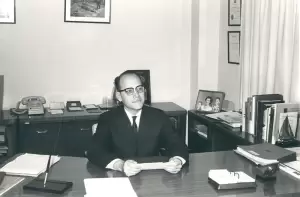
Another Democrat, U.S. Congressman Paul Rogers, known as “Mr. Health,” worked with Dr. Brumback to help migrant workers, which had effects not just locally, but nationwide. Nicknamed “Mr. Health,” Rogers sponsored dozens of important pieces of legislation related to health care. He chaired the House Subcommittee on Health and the Environment for eight years. Both the main plaza of the National Institutes of Health in Bethesda, MD, and the Federal Building and Courthouse in West Palm Beach were named in his honor.
Thomas F. “Tom” Lewis (1924-2003) served in World War II and the Korean War, ending his service in the Air Force at Morrison Field; he later moved to North Palm Beach to work for Pratt and Whitney Aircraft. Known as “Mr. Republican,” Lewis served as mayor of North Palm Beach before representing the North County district in the Florida House of Representatives (1972 to 1980) and the Florida Senate (1980 to 1982). He was elected to the U.S. Congress in 1982. Lewis led the effort to build the Veterans Affairs Medical Center in Riviera Beach and was instrumental in saving the Air Force Reserve’s Hurricane Hunter program, which sends aircraft into storms to collect meteorological data. His wife, Marian V. Lewis, was a member of the Florida House of Representatives from 1986 to 1992.
Three friends who grew up in West Palm Beach became presidents of the Florida Senate; one went on to the U.S. Congress. Jerry Thomas (1929-1980) was first to be elected to the Florida Senate, where he served 1965 to 1972 and co-sponsored the Florida Sunshine Law, which made government accessible to the people. He left public service for a successful business career in the financial sector until an early death from cancer. Thomas encouraged Philip Daniel “Phil” Lewis, who was active in commercial real estate before and after he served as senator from 1970 to 1980.
Attorney Harry Allison Johnston II (1931- ) was a member of the Florida Senate from 1974 to 1986 and a U.S. congressman from 1989 to 1997. Lewis and Johnston, though retired from elected office, have continued to use their knowledge and experience to serve their former constituents.
